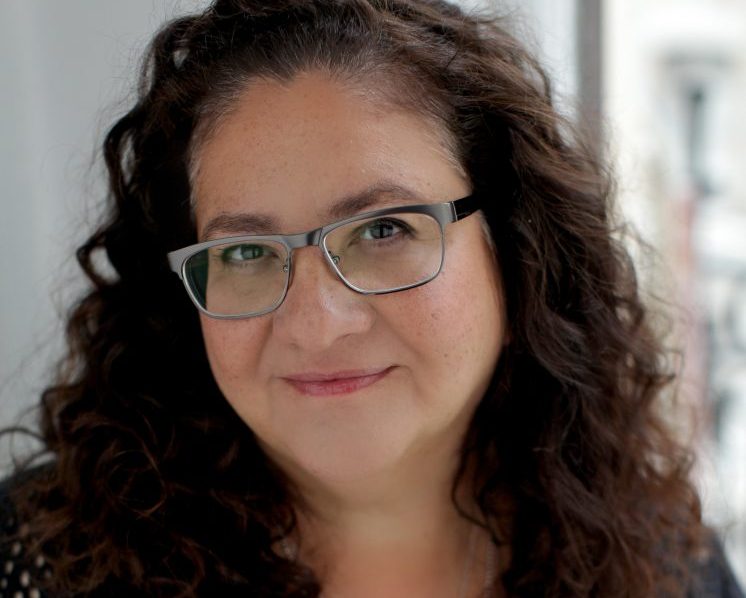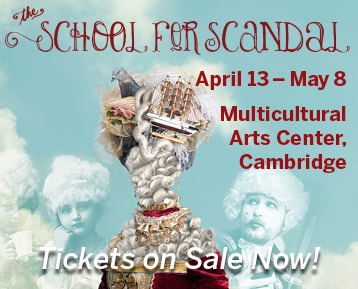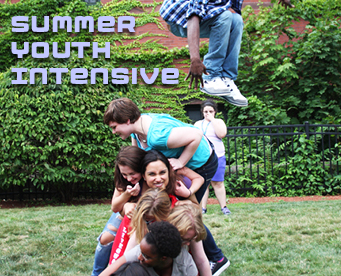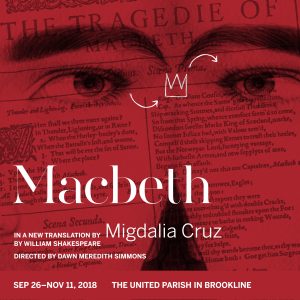
Migdalia Cruz: Translating Macbeth
ASP sits down with Migdalia Cruz & discusses translating MACBETH
The Oregon Shakespeare Festival commissioned playwright Migdalia Cruz to translate Macbeth as part of their Play on! project, an national initiative that seeks to broaden access to Shakespeare for contemporary audiences.
Actors’ Shakespeare Project is currently in rehearsals for the world premiere of Cruz’s translation. ASP sat down with Cruz during her recent visit to Boston and picked her brain on translating the Scottish play.
Could tell us a little bit about yourself? Where are you from? What inspired you to be a playwright and what are some of your creative influences?
I’m Nuyorican from the Bronx, born in the Bronx of Puerto Rican parents. I began my trajectory as a writer because I began to find that I needed a place to express who I was, in a way that I didn’t feel necessarily entitled to express at school or in other normal places. Theatre or stories and storytelling became important to me because I felt like our stories weren’t really being told.
I think I’ve always written from this place of mourning and trying to understand loss both personal and cultural. And when you’re poor and from the underclass or the minority, whatever you want to call us, I think often you’re also made to feel like you’re not entitled to poetry. So I thought, “Huh, so I think to have to write poetry.” I think I have to write about our stories. I think I have to make people understand that we have value. And how do you do that? And the only tool I had was to write; that just seemed my option. So that’s how I began to write.
Could you speak about the Play on! project? What exactly you were tasked to do as a translator?
I can only speak from my point of view about what it is. I think we each understood it differently and took different journeys with the plays. But what I understood was: the idea was to translate them to clarify and do no harm. That was the number one thing. So for me, going piece by piece and word by word and saying: “Can I change this? Is this word totally clear when I hear it? Not just when I see it on the page? So checking the aural clarity was important for me.
I made sure that the language is real spoken language and that it scans correctly, and that it doesn’t sound like some bizarre No Fear Shakespeare, dumbed down version. That’s certainly not ever what I wanted to do and that was the fear for all of us, I think. Are we being tasked to make something beautiful ugly? And I thought that’s not what I want to be a part of, but then I saw myself trying to clarify things and think about how much, how often Shakespeare is cut in performance. And in finding those places that are usually cut, because I thought that’s the stuff that is really unclear. Because that’s why it’s they get away with it. Because people don’t understand it. So if they cut it, nobody misses it. And I was like: let’s make that clear so people understand what they’re cutting before they do. And so I thought that would be a service to the playwright.
And I think there was an effort by Play on! to make sure there were lots of people of color involved in this. And that there was a different gaze on the work, that was not necessarily the gaze that was the white male gaze of the original playwright. But it was actually that we could open up the world to include women, to include minorities, to include LGBT people. That there was a different kind of energy that could be added to this already beautiful work, that would enhance an audience- a new audience’s experience of it without taking anything away from from the original.
Why Macbeth?
What attracted me to Macbeth was that it was also a play about mourning. When I first read it, I felt like, I understand their acts of rage and passion and monstrousness that doesn’t come from being a monster but that actually comes from being human and comes from a place of deep and dark mourning and sadness and loss. So when this project began with Lue Douthit and Play on!, I thought- I think I want to do that and I want to do that play.
Macbeth is my man. And my woman. Because I also thought that Lady Macbeth was an extraordinary character, who I’d never felt was played with the depth that she requires. Because I felt like, you know, they always play the monster and they always make her the woman who goads the man to monstrous behavior and I thought- that doesn’t seem- it’s possible. I know monstrous women. But I feel like monsters come from someplace. You’re not just born a monster. You develop into one. You’re pushed into one. Your rage moves you into a place that’s dark. And unfathomable. So then I ended up with Macbeth, and I was really happy about that choice because I felt like he also chose me.
So when I first started working on it, I actually decided I needed to go do a pilgrimage to his grave. Because it’s something that I do with all my plays- is that I create altars to my characters. So I took this ridiculously long journey to an island in the Hebrides called the Isle of Iona, where I heard that he was buried.
I always feel like I need to do prayers about it or somehow create a ritual that allows me to enter those worlds. That’s their work and that’s their world. And here I am and you know, it’s like- okay, I prostrate myself before you. And let me in. And let me see if I can- what is the thing that I can do with your work that maybe you were not allowed to do at your time or that somehow clarifies the way for future audiences or that somehow having Migdalia’s voice in the mix with yours is an okay thing to have?
So I made my pilgrimage to Macbeth and then I thought- okay, I think I really am ready to write this play- rewrite it, reimagine it, reinvent it and maintain it. Don’t do anything that will kill it. Be careful with the poetry. Be really careful with the poetry. But also understand who you’re writing it for and that maybe there’s places that in the past have been edited that now will no longer need to be edited because people will actually understand it. I think a lot of people pretend to understand Shakespeare. And it took me almost three years to really understand this one play.
So there are these little things that I can change, but I also have to maintain the form of a play. So then it was also teaching myself his poetry and trying to keep to his syllabic choices and he didn’t always keep to the pentameter, of course. He went in and out. He did couplets. He did blank verse. So I have to keep changing and I have to keep matching or trying to match the language. So it was, you know, a big task, and I was happy with the result. I mean, I feel like every time I hear it, I go: “Oh, is that right? Should I have changed that? Did I change it to the right thing?” Have I really done no harm? And for me, that was number one. Make sure you maintain the integrity of the text.
And then the second part was: if you’re going to be in there, what are you in there for? And I looked at the witches. And I felt like the witches were placed there. You know, there there’s a lot of speculation about them. He chose songs from Thomas Middleton for them- he didn’t even write them. So I thought, well, maybe there’s room there for more Cruz to enter this world.
How much of it is Shakespeare’s language and how much is your language?
I don’t ever do things like percentages but somebody told me that it’s 70/30. But I feel like it’s more 80/20. 80 being him and 20 being me or maybe even less. I mean, I feel like my changes were subtle. There was like one word change; I changed punctuation and often a part of that was making the dramatic structure of the play more clear- like an emotional dramatic structure, not just a plot. His plot is clear. Clearly, it’s clear. But I mean, I felt like the the personal motivations of the actor was maybe hidden. I think it was uncovered by actors after many weeks of rehearsal and that the audience related to the actors’ reaction to the words. But I don’t think the audience actually understood the words. How do you make it all come together? And how do you help the actor just work on their emotional journey and not just be dramaturg looking up every word and then just presenting a bunch of words that are beautiful? But maybe they haven’t really uncovered the true emotional and visceral meaning of the moment.
What has it been like seeing this translation come to life in rehearsal?
You know, it’s funny because I didn’t read it before I came. I finished this draft last year. So I was thinking, “Is it going to sound weird and awkward? Is it going to be all those things that I feared it might be?” Will it stick out as something that is so foreign to Shakespeare that it becomes its own thing which is never what the task was. It’s a translation. It’s not an adaptation. In hearing it, I was happy with a lot of the changes that I made, and I didn’t make that many changes, but the ones that I did make, I think, still seem to clarify the way that- it made emotional moments resonate the way I wanted them to.
Still makes me nervous. It makes us all nervous to be touching Shakespeare. But, I feel like I gave him the reverence I would want someone to give me touching my work. I approached it as writer to writer. I didn’t approach it as writer to master which some people may take exception that I didn’t: I didn’t prostrate myself enough in front of Shakespeare. But I sort of feel like you can’t go there without going there. So either I commit to the story and I try to make that story clear or I just sit in a church and pray to Shakespeare which some people do apparently. But that’s not me.
And I thought watching it in rehearsal- it made me feel like there is a good reason to be doing this. And Shakespeare will be fine. This is in a way an experiment by modern dramatist in rediscovering text and reconnecting to a text that perhaps we’re just sort of taught about in some weird academic way but never actually enter it viscerally and I think it’s really important that- I think we’ve all been entering it in a way that that makes the work fresh.
I hope people come see it. It’ll be interesting. It’ll be interesting to have that discussion of what all these plays are doing and what the conversation is between now and then.
Macbeth, directed by Dawn Meredith Simmons, runs September 26- November 11 at the United Parish in Brookline.
You May Also Like

Thank you for supporting our Gala
Oh what a night! See scenes from our Scandalous Gala.
> Learn more
Scandal in Cambridge?
ASP takes over the Multicultural Arts Center for our latest production!
> Learn more
Summer Youth Intensive begins July 5
ASP Youth take to the stage again for an intensive study into A Midsummer Night’s Dream!
> Learn more
